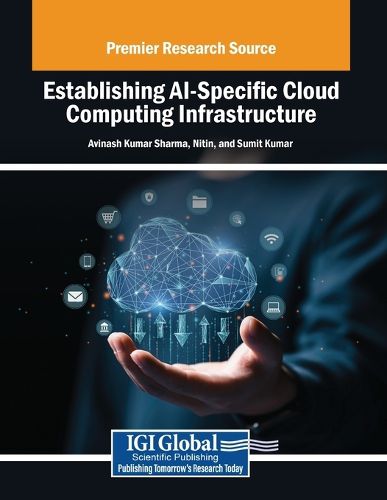Readings Newsletter
Become a Readings Member to make your shopping experience even easier.
Sign in or sign up for free!
You’re not far away from qualifying for FREE standard shipping within Australia
You’ve qualified for FREE standard shipping within Australia
The cart is loading…






This title is printed to order. This book may have been self-published. If so, we cannot guarantee the quality of the content. In the main most books will have gone through the editing process however some may not. We therefore suggest that you be aware of this before ordering this book. If in doubt check either the author or publisher’s details as we are unable to accept any returns unless they are faulty. Please contact us if you have any questions.
As artificial intelligence (AI) continues to drive innovation across industries, the need for specialized cloud computing infrastructure to support AI workloads is critical. Traditional cloud platforms often struggle to meet the high computational demands and storage requirements of AI models, especially as they grow in complexity and scale. Establishing AI-specific cloud computing infrastructure involves designing systems optimized for the needs of AI, such as powerful processing capabilities, massive data storage, and real-time processing. With advancements in hardware like graphics processing units and tensor processing units, along with sophisticated data management solutions, businesses can better harness the full potential of AI technologies. This specialized infrastructure enhances the performance and scalability of AI applications while enabling faster innovation and more efficient deployment of AI-driven solutions across sectors. Establishing AI-Specific Cloud Computing Infrastructure explores how AI has evolved as a transformative new technology, capable of delivering large incremental value to a wide range of sectors. It examines recent advances in innovation, specifically how computing power, data storage, and digitized data have led to AI-based applications for business and governance. This book covers topics such as digital technology, sustainable development, and artificial intelligence, and is a useful resource for computer engineers, business owners, academicians, data scientists, and researchers.
$9.00 standard shipping within Australia
FREE standard shipping within Australia for orders over $100.00
Express & International shipping calculated at checkout
Stock availability can be subject to change without notice. We recommend calling the shop or contacting our online team to check availability of low stock items. Please see our Shopping Online page for more details.
This title is printed to order. This book may have been self-published. If so, we cannot guarantee the quality of the content. In the main most books will have gone through the editing process however some may not. We therefore suggest that you be aware of this before ordering this book. If in doubt check either the author or publisher’s details as we are unable to accept any returns unless they are faulty. Please contact us if you have any questions.
As artificial intelligence (AI) continues to drive innovation across industries, the need for specialized cloud computing infrastructure to support AI workloads is critical. Traditional cloud platforms often struggle to meet the high computational demands and storage requirements of AI models, especially as they grow in complexity and scale. Establishing AI-specific cloud computing infrastructure involves designing systems optimized for the needs of AI, such as powerful processing capabilities, massive data storage, and real-time processing. With advancements in hardware like graphics processing units and tensor processing units, along with sophisticated data management solutions, businesses can better harness the full potential of AI technologies. This specialized infrastructure enhances the performance and scalability of AI applications while enabling faster innovation and more efficient deployment of AI-driven solutions across sectors. Establishing AI-Specific Cloud Computing Infrastructure explores how AI has evolved as a transformative new technology, capable of delivering large incremental value to a wide range of sectors. It examines recent advances in innovation, specifically how computing power, data storage, and digitized data have led to AI-based applications for business and governance. This book covers topics such as digital technology, sustainable development, and artificial intelligence, and is a useful resource for computer engineers, business owners, academicians, data scientists, and researchers.